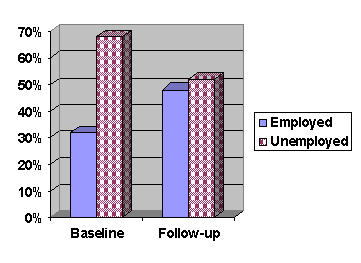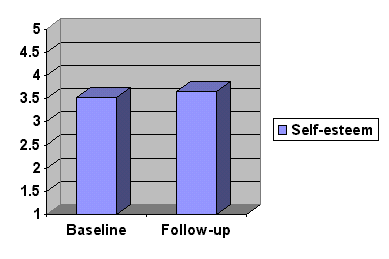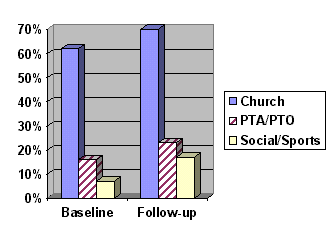Changes in Learners' Lives One Year After Enrollment in Literacy Programs
An Analysis from the
Longitudinal Study of Adult Literacy Participants in Tennessee
Mary Beth Bingman, Olga Ebert, and Michael Smith
Center for Literacy Studies, University of Tennessee, Knoxville
NCSALL REPORT #11
December 1999
What changes occur in the lives of adult learners when they participate in literacy programs? The outcomes of participation in adult literacy programs have typically been measured in terms of gains on standardized tests and/or passing the General Educational Development (GED) exam. The other positive changes occurring in students’ lives, especially those outside the classroom, generally are not assessed, perhaps because they are difficult to track and to measure. A recent longitudinal study of adult literacy learners in Tennessee found a variety of outcomes in learners’ lives, including an increased rate of employment, increased self-esteem, and increased community participation. Perhaps, rather than taking workforce preparation as an isolated objective, adult basic education needs to be seen as a process through which participants gain skills and confidence, enabling them to be truly productive members of the modern society, as workers, citizens, and family members.
In an effort to assess the long-term impacts of adult literacy programs, the Center for Literacy Studies (CLS) conducted the Longitudinal Study of Adult Literacy Participants in Tennessee from 1991-1995. The purpose of the study was to identify if and how participation in literacy programs impacted the lives of adults. The study focused on changes in the lives of 450 participants in the domains of work, family, and community after they enrolled in literacy programs. The participants from three cohorts (1991-92, 1992-93, and 1993-94) were enrolled at literacy Level One, and their initial scores on the ABLE (Adult Basic Learning Exam) reading test were below the sixth- grade level. Follow-up surveys were administered annually through 1995, although the number of participants who could be located diminished each year. Two interim reports were published by the Center for Literacy Studies in 1993 and 1994 (Merrifield, Smith, Rea, Shriver, 1993 and Merrifield, Smith, Rea, Crosse, 1994).
This final report examines the responses of the 199 adults from the three cohorts who took part in a follow-up interview approximately one year after their initial enrollment. Results reported here are based on their responses to 116 questions dealing with employment, literacy practices, involvement with children’s schooling, community awareness, self-esteem, and life satisfaction.
Two research questions were addressed in this analysis: What aspects of life change one year after enrollment in an ABE (Adult Basic Education) program? Will substantial participation in an ABE program produce more change in various aspects of life than limited participation in an ABE Program?
After one year, participants in the study reported positive change on at least one item in each of the categories examined by this study: employment, self-esteem, community, and children’s education. There was not a control group in this study, and so one cannot say that these changes were a result of participation in an adult literacy class. But the changes were greater than would be expected by chance, and the common variable among the participants (in addition to being Tennessee adults) was enrolling approximately one year earlier in an adult literacy program.
The changes these adults reported one year after enrollment included a higher rate of employment, increased self-esteem, increased involvement in community organizations, and increases in some uses of literacy.
-
An increase in rate of employment from 32% to 48%.
Graph 1: Increase in Employment Rate

- An overall increase in self-esteem (as measured by the Rosenberg Self-Esteem Scale) from 3.52 to 3.66 on a 5- point scale (p<.01).
Graph 2: Increase in Self-Esteem

- Increased involvement in community (religious, parent-teacher association, social/sports) organizations (p<.05).
Graph 3: Increase in Community Involvement

Other positive changes found were:
- Positive changes in 3 of 8 literacy practices examined (paying bills, working with numbers on the job, needing to memorize because of limited reading ability) (p<.05).
- Increase in number of people who thought a book was a good gift for a child (p<.05).
- An increased overall satisfaction with their financial situation in Cohorts 2 and 3 (p<.05).
As this data shows, after participation in adult basic education, even for a short time, the adult learners in this study reported improvements in some areas of their lives. There were, however, no significant changes in community awareness or in how people felt about their community. People were not more likely to attend community meetings or talk about politics. There was not a significant increase in reading reported, nor a significant increase in involvement in children’s education. There were few significant changes in life satisfaction.
The analysis for this report also compared the 32% of the group with substantial participation (at least 80 hours of class since enrollment) with the 68% with limited participation (fewer than 80 hours). There were few significant differences between those with limited hours of classroom time and those who had substantial participation. Those with substantial participation did, however, report significantly more satisfaction with their family life than those with fewer than 80 hours. Those with substantial participation were more likely to say that a book is a good gift for a child. On the other hand, those with limited participation were more likely to report a decrease in the need to memorize because they couldn’t read well than those with substantial participation. And 18.5% more of those with limited participation were employed after a year while 12% more of those with substantial participation were employed.
What do these findings mean for adult basic education? The analysis reported here supports the conclusion that participation in adult basic education is a positive factor in regard to employment. It supports the often-reported (Beder, 1991; Beder, 1999) conclusion that participation in adult basic education leads to increased self-esteem. Detailed information on the programs is not available; however, qualitative interviews with participants in seven of the programs describe programs where the teachers were very supportive and the curriculum was primarily structured around basic skills acquisition and practice (Bingman & Ebert, in press).
There are multiple variables impacting both employment and self-esteem, but taking the step to enroll in an adult education program, even one without a specific workforce focus, may have led to increased self-esteem and to taking the additional step of seeking employment. This suggests that while a focus on work-force preparedness might strengthen employment outcomes, programs that focus more on basic skills development also support employment outcomes.
The study also suggests that information about the curricula and instructional approaches of the programs in which adult literacy students participate are needed to really understand what factors contribute to outcomes or lack of outcomes in learners’ lives. Without an understanding of program content, outcomes studies can inform adult educators about changes in learners’ lives, but do not indicate what program modifications might improve outcomes.
References
Beder, H. (1991). Adult Literacy: Implications for policy and practice. Malabar, FL: Krieger Publishing Co.
Beder, H. (1999). The outcomes and impacts of adult literacy education in the United States. Cambridge, MA: National Center for the Study of Adult Learning and Literacy
Bingman, M.B. & Ebert. O. (in press). “I’ve come a long way”: Learner-identified outcomes of participation in adult literacy programs. Cambridge, MA: National Center for the Study of Adult Learning and Literacy.
Merrifield, J., Smith, M., Rea, K., & Shriver, T. (1993). Longitudinal study of adult literacy participants in Tennessee: Year one report. Knoxville, TN: Center for Literacy Studies.
Merrifield, J., Smith, M., Rea, K., & Crosse, D. (1994). Longitudinal study of adult literacy participants in Tennessee: Year two report. Knoxville, TN: Center for Literacy Studies.
Full Report Available
To receive a copy of the full report, send a request indicating the report number or title
along with a check or money order in the amount of $10, payable to World Education, to:
Caye Caplan
NCSALL Reports
World Education
44 Farnsworth Street
Boston, MA 02210
or call: (617) 482-9485


 Printer-friendly page
Printer-friendly page